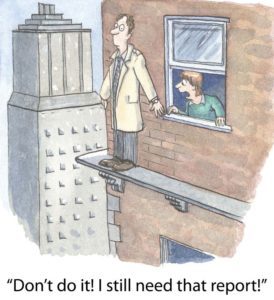Lori B. Rassas's Blog, page 2
May 16, 2017
Newsflash to Job Seekers: Your Job Search is Not About You

Newsflash to Job Seekers: Your Job Search is Not About You
What is the most importance piece of advice I give to job seekers? Your job search is not about you!
Many of us grew up thinking that the world would bend to our needs and desires. We were raised with the expectation that work equaled self-actualization, meaning our jobs should provide us psychological, emotional, and material satisfaction in addition to a steady paycheck. Not to burst anyone’s bubble, but in today’s loyalty-free workplace there isn’t time for that.
Consider this:
Jared worked at the same company for twenty-four years. He’s never missed a day of work, nor has he ever reported late to his 9:00am shift. Coworkers are therefore concerned when Jared is not at his designated seat for the regularly scheduledTuesday morning 9:30 staff meeting.
Six minutes after the meeting starts, Jared stumbles into the meeting room, visibly shaken. “I passed out on the stairs heading down the subway and nearly died,” he explains. His boss replies, “You mean to tell me it took you thirty-six minutes to roll down a flight of stairs?”
OK, this may seem like an extreme example. But the reality is that the boss’ comments are perfectly aligned with today’s loyalty-free workplace. If you’re Jared’s spouse (or perhaps one of his coworkers witnessing this scenario), your natural reaction is to worry about Jared’s well-being. If you’re Jared’s boss, however, your focus on the company and the work that needs to get done.
Let’s face it: Work is work. No one wakes up in the morning and says, “Have a great day, honey. I’m off to have fun!” More likely you wake up and say, “I really have to get going, or else I’ll be late for work.” It’s a professional obligation, and we have to be professional at all times.
Let me try to reinforce this very important point in a different way:
A woman is arguing with her husband over whether he is being aggressive enough about asking for a raise. “You need to tell your boss that you have five children, a sick father, three dogs, and a wife that has to stay up all night cleaning your home because you cannot afford a housekeeper,”she insists.
The next day, the husband returns home and announces that he has been fired.
“Why?” yells the wife. “What did you do?”
The husband says, “My boss told me I have too many outside activities.”
The reality is, if you’re looking for a job, potential employers could not care less if you’re unemployed with a mortgage to pay, growing medical bills, and absolutely, positively need this job. A prospective employer will see this desperation as a distraction that may, and probably will, prevent you from being productive. All a prospective employer wants to know is (a) Do you have the skills that they’re looking for and (b) If they hire you, can you hit the ground running and get the job done?
Even if you consider a particular vacancy to be your “dream job,” the last thing a hiring manager wants to hear is how excited you are about working for the company. Believe it or not, sharing that information can actually hurt your chances of landing the job. You have to remember that it’s not about you—it’s about what you can do for the company. In the loyalty-free workplace, making it about you will be a hindrance to your success.
Think about your friends who hijack conversations. They’re the ones who, when we tell them how depressed we are or that we’re going through a really bad time, turn it around so that they’re talking about their problems, instead of listening to ours. In other words, they make themselves the center of attention. In most cases, you can right the situation by reminding your friend, “Hey, this isn’t about you!” But if you hijack a job interview by bringing up something that has nothing to do with the company’s needs, you may not get a second change and you will end up eliminating yourself from further consideration.
The point is that employers want what employers want—and almost always get it. So, if you want to have the greatest chance of success in your job search, make sure every single thing you write, say, or present in the hiring process is about what you can do for your employer—and what your employer can do for you will follow, in the form of that coveted job offer that has previously been just beyond your reach.
Interested in learning more? I have you covered! Head over to Amazon to look inside The Perpetual Paycheck: 5 Secrets to Finding a Job, Keeping a Job, and Earning an Income for Life in the Loyalty-Free Workplace, or my new book Over the Hill But Not the Cliff: 5 Strategies for 50+ Job Seekers to Push Past Ageism & Find a Job in the Loyalty-Free Workplace.
The post Newsflash to Job Seekers: Your Job Search is Not About You appeared first on Lori B. Rassas, LLC.
May 3, 2017
Forbes Interview with Lori Rassas
Forbes.com featured an interview I gave to discuss my newest book Over the Hill But Not the Cliff: 5 Strategies for 50+ Job Seekers to Push Past Ageism & Find a Job in the Loyalty-Free Workplace! Read the interview on Forbes.com here: http://www.forbes.com/sites/nextavenue/2017/05/01/how-to-get-a-job-if-youre-over-50/#1277c259497e
The post Forbes Interview with Lori Rassas appeared first on Lori B. Rassas, LLC.
April 24, 2017
Challenging Times at Work? Forget About Whether The Glass Is Half Empty Or Half Full & Focus On What You Can Do With The Water
As you navigate the modern workplace, you must always focus on your main goal: earning and growing your perpetual paycheck. This will not always be easy, since today’s work environment is objectively difficult and no one is immune from its hardships and heartaches. Every day I hear about employees facing challenging times. You may have been passed over for a promotion, or not received a job offer after a few rounds of interviews. Perhaps you were laid off through no fault of your own, were terminated for behavior you now regret, or find it challenging to regain your position after taking a leave of absence to tend to a personal matter. The good new is that regardless of your situation, more often than not, even the most difficult situations can become the launching pad for different types of successes.
The business world is filled with examples of forward-thinking entrepreneurs who see crises as opportunities for future profits. Google, for one, earns close to $500 million a year by placing advertisements on the websites people land on after having mistyped a letter or two in the name of the website they initially intended to visit. Let me give you a personal example. I have fond memories of a birthday dinner as a young child, when my parents told me I could invite eight of my closest friends to a “grown-up” dinner at one of my favorite chain restaurants. My family, friends, and I all congregated in the vestibule of the restaurant more than fifteen minutes before the time of our guaranteed reservation for a party of thirteen, only to find ourselves still waiting for our table almost two hours later. As soon as the conversations turned to vows to never return, two managers entered the vestibule clapping their hands, playing kazoos, and singing “Happy Birthday” to me as they wheeled out a tray of appetizers for us to sample. The presentation was a memorable event, which we talked about for weeks, the highlight of which was the free appetizers. The two-hour delay was never mentioned. The point is, everyone in business is looking for a way to convert wrongs into rights and obstacles into steps forward.
Even when things don’t go well at work, with the right mindset you can still turn a trouble into a triumph and pave the way for future success. Consider the classic story of two shoe salesmen who traveled to an underdeveloped area in Africa and found that no one in the area was wearing any shoes. The salesmen immediately sent simultaneous emails back to their corporate headquarters. The first man wrote, “This trip is a waste of time—no one wears shoes!” The second man wrote, “Double the original order. The demand will be at least twice what we originally expected!”
Remember, too, the words of Winston Churchill: “Difficulties mastered are opportunities won.” Put another way, how you characterize something impacts how you respond to it. Labeling an event as a problem compels you to adopt a negative approach, whereas labeling it as an opportunity compels you to adopt a positive approach. Positive people continue to move forward regardless of what is happening. Negative people use whatever is happening around them as a justification for remaining in the same place, moving backward, or moving in the wrong direction. Viewing workplace changes as opportunities for growth increases the chances that you will uncover ways to produce significant rewards.
Workplace changes are stressful, unsettling, and may cause you to reexamine your place and purpose. These changes often have a domino effect, causing decreased morale and depression at a time when employees are asked to not only continue with their work, but produce even better results. When faced with any of these changes, rather than pulling back and exerting the minimal amount of work necessary to collect your paycheck, try seeing these crises as opportunities. In most cases, by stepping up you’ll put yourself in a position to reap immediate rewards, before anyone else.
Interested in reading about some specific strategies to convert workplace troubles to triumphs? I have you covered! Head over to Amazon to look inside The Perpetual Paycheck: 5 Secrets to Finding a Job, Keeping a Job, and Earning an Income for Life in the Loyalty-Free Workplace, or my new book Over the Hill But Not the Cliff: 5 Strategies for 50+ Job Seekers to Push Past Ageism & Find a Job in the Loyalty-Free Workplace.
The post Challenging Times at Work? Forget About Whether The Glass Is Half Empty Or Half Full & Focus On What You Can Do With The Water appeared first on Lori B. Rassas, LLC.
April 19, 2017
Jumping into Your First Midcareer Job Search? Remember It’s Never Too Late To Take Your First Step
Jumping into a job search the first time in a number of years? No need to worry: No matter what your age, or where you are in your career or job-search process, you can do this. It is never too soon or too late to modify your strategies to achieve the greatest amount of success.
Consider the fact that financial advisors always emphasize the importance of starting to save for retirement at the earliest age possible. We all know that if you start saving in your twenties, you will increase the chances of achieving financial security during your retirement years. But, even if you never thought about saving for retirement until you were fifty-five or sixty-five, it is not as if the advisor will say, “Sorry, too late, there is nothing I can do for you.” More likely, the advisor will work with you so that you can make the best choices from this point forward. Since giving up on your job search is not an option, the only way to turn your fortunes around is to make a change today.
Before you start to limit your goals based on your late start, keep in mind that countless others have achieved great success later in life. Vera Wang did not start designing wedding dresses until she was forty. At fifty-seven, Chesley “Sully” Sullenberger III landed US Airways Flight 1549 in the Hudson River, saving the 155 passengers aboard; and at sixty-five, Colonel Harland Sanders started the KFC franchise. Ronald Reagan was fifty-five when he was elected to his first political office, and he became president at the age of sixty-nine, just a few weeks before his seventieth birthday. Even President Reagan was outdone by Nelson Mandela, who was seventy-six when he became president of South Africa.
There is not doubt that engaging in a meaningful job search is hard work. But it is also the most important job you will ever have. So, as you expend this enormous effort to research companies (both for hidden opportunities, as well as traditional ones), scour LinkedIn to develop new contacts, or rework your cover letter to paint the picture of a vibrant candidate who can hit the ground running, always remember that these are the stepping stones to achieve unprecedented success.
Above all, do not be discouraged by how daunting it may seem, or by the number of times you hear “no.” Think about how excited everyone is when a baby takes her first steps. Does anyone ever mention the 211 times she fell to the floor before she finally made it? Of course not! Instead, they jump up and down and gloat about her success. The same idea applies to your job search. All you need is one person or company to say “yes.” So engage in a full court press and keep your eye on the ultimate prize, an employer that values the wealth of experience you bring to the table and is prepared, and even excited, to compensate you for it.
Interested in learning about some specific techniques to jump start your job search? I have you covered! Head over to Amazon to look inside The Perpetual Paycheck: 5 Secrets to Finding a Job, Keeping a Job, and Earning an Income for Life in the Loyalty-Free Workplace, or my new book Over the Hill But Not the Cliff: 5 Strategies for 50+ Job Seekers to Push Past Ageism & Find a Job in the Loyalty-Free Workplace.
The post Jumping into Your First Midcareer Job Search? Remember It’s Never Too Late To Take Your First Step appeared first on Lori B. Rassas, LLC.
A Dog, Cinderella, and Your Job Search
Have you heard the joke about the dog that walked down the street and saw this sign in the office window:
HELP WANTED
MUST TYPE 70 WORDS A MINUTE
MUST BE COMPUTER LITERATE
MUST BE BILINGUAL
EQUAL OPPORTUNITY EMPLOYER
The dog applies for the position, but is quickly refused.
“I can’t hire a dog,” says the office manager.
The dog points to the line “equal opportunity employer.”
The office manager sighs and asks if the dog can type. The dog walks over to a typewriter and flawlessly bangs out a letter.
“Can you operate a computer?” asks the manager.
The dog sits down at a terminal, writes a program and runs it perfectly.
“Look, you have fine skills, but I still can’t hire a dog,” says the exasperated office manager. “I need someone who’s bilingual. It says so right in the ad.”
The dog looks up at the manager and says, “Meow.”
–Don Weinstein
* * * *
Smart dog! And why is this relevant to your job search process? Because in the loyalty-free workplace, you cannot be a dog who might learn new tricks. If you are granted an interview, you must show the prospective employer right then and there that you know all of the “tricks” necessary to excel at the job. How do you show a prospective employer that you are the perfect fit? By identifying precisely what the employer is looking for and providing it.
And, what accounts for this change? Back in the days when employers had plenty of staff, they could afford to hire a candidate who was a close fit (as far as qualifications go), but not a perfect one. In some cases, they might even hire people who were clearly not qualified for the position, but had enough potential that they would “find a spot for them.” In the loyalty-free workplace, however, that luxury no longer exists. “Pretty good” or “close enough” will not cut it anymore. With more people than ever competing for fewer jobs, companies have to be more selective. Like Prince Charming, prospective employers are looking for the one person who is the perfect fit for that glass slipper—and if it doesn’t fit (or if you say something during the interview that suggests you would be a bad fit)—they almost always have stack of other qualified candidates to consider instead of you. I refer to this as the Cinderella fit, and this is precisely where you need to be if you want to land that coveted new job.
This is an incredibly important point for older job seekers. One comment I regularly hear is that applicants do not understand why they are not interviewed for all of the jobs for which they are overqualified, and for which they could clearly perform with their eyes closed. And, the longer you are in the workforce, the more experience you will likely acquire, and the greater the likelihood you will find yourself in this situation. The problem is that while we may see an incredible value in every year of experience we get under our belts, prospective employers may see it differently.
Why would a company reject a candidate who can offer more than what they are looking for? There really is truth to the statement that there is too much of a good thing. If a hiring manager is looking for a candidate with five years of experience, then a candidate with one year of experience is just as unqualified as a candidate with twenty. Further, the more experienced candidate may not move forward in the process because of the likelihood that they will (understandably) expect a salary that is commensurate with that expertise. In other words, while the hiring manager may appreciate the level of experience and all that it offers, it is quite possible that they either cannot afford or simply do not want to offer a compensation package that is commensurate with it. In this case, the extra years of experience, even though valuable, are not valuable to them.
So what is the takeaway? When looking for a job find out exactly what the hiring manager wants, which you can usually pinpoint from the job posting or description. Then, illustrate why you are the perfect fit, the Cinderella fit—and be sure that you are nothing more and nothing less.
Interested in learning more? I have you covered! Head over to Amazon to look inside The Perpetual Paycheck: 5 Secrets to Finding a Job, Keeping a Job, and Earning an Income for Life in the Loyalty-Free Workplace, or my new book Over the Hill But Not the Cliff: 5 Strategies for 50+ Job Seekers to Push Past Ageism & Find a Job in the Loyalty-Free Workplace.
The post A Dog, Cinderella, and Your Job Search appeared first on Lori B. Rassas, LLC.
March 12, 2017
Attention Job Seekers: Gray Hair is Just Gray Hair

Photo Credit: Anastasia Kazakova @ 123rf.com
Some positive news for older job seekers: some of the most common job-search challenges you are facing have nothing to do with your actual age, but have to do with what your age represents.
What do I mean by this? Let me give you an example: I had a childhood friend who turned gray prematurely. By the time we were juniors in high school, she had a full head of gray hair. She often talked about the time, money, and effort it took to regularly color her gray locks, until at one point she just decided to forgo those efforts. The bright side, she joked, was that she no longer had to fear the sight of a few gray strands.
Sure, from time to time, someone would make a comment, but most of the time her gray locks were a non-issue and never interfered with anything she tried to do. And, I can assure you that, whenever my friend applied for seasonal summer jobs, she never complained about failing to get a job as a short-order cook, a lifeguard, or a retail sales clerk because of the color of her hair. Why? Because hiring managers do not eliminate candidates on the basis of gray hair—gray hair is just gray hair. What hiring managers do consider, whether consciously or unconsciously, is what the gray hair represents, or what they think the gray hair represents.
Right or wrong, gray hair on a candidate who is fifty or older may represent someone who no longer has the drive to work full time, or who may have health problems now or in the near future, or who has limited technological knowledge. For my eighteen-year-old friend, however, gray hair represented none of that. First, nothing on her resume suggested she was an older candidate; this was critical because even if the hiring manager had the tendency to pass over aging candidates, this never become an issue during an initial review of her application. And second, once my friend met with the hiring manager, age was a non-issue because she came across as a vibrant, chatty, larger-than-life teenager who could sell a hot dog to a vegetarian.
If you are an older job seeker, the key to job-search success is to recognize negative perceptions that may be inferred from your age and then strategize to overcome those obstacles so that they do not impact your job-search process. This means learning about and examining each perception and working to send a clear message that it does not apply to you. If hiring managers perceive older candidates as tired and unmotivated, you must “make over” that image by presenting yourself as a candidate who is energetic, motivated, and capable of making an immediate and valuable contribution to the company.
Does this mean that you need to start running half-marathons in your fifties so that you can match the vigor of a candidate in their twenties? No. All I am saying is that a hiring manager will likely look for a candidate who can attend, and possibly even lead, important meetings with the energy, enthusiasm, and commitment necessary to close the deal. Not only do you want the hiring manager to see you as that candidate, you want them to smile at the notion of you whizzing by coworkers who are twenty years your junior.
Remember, everything you do in the job-search process—from selecting which opportunities to pursue, to drafting your cover letter and resume, to what you wear and how you behave in an interview—should be geared toward eliminating any preconceived notions a prospective employer has about your age. Is that unfair? Perhaps, but look at it this way: The more you do to dispel these preconceived notions, the more level the playing field becomes—and the less your age becomes a factor. And, when armed with this knowledge you will be prepared to achieve unprecedented success—regardless of which birthday is next.
Interested in learning more? I have you covered! Click here to head over to Amazon to look inside my new book Over the Hill But Not the Cliff: 5 Strategies for 50+ Job Seekers to Push Past Ageism & Find a Job in the Loyalty-Free Workplace.
The post Attention Job Seekers: Gray Hair is Just Gray Hair appeared first on Lori B. Rassas, LLC.
January 7, 2016
New England Book Festival

Thanks to the New England Book Festival for awarding The Perpetual Paycheck honorable mention in the general nonfiction category! You can download the Ebook for FREE today on Amazon as a way to thank everyone for their support. Just click here!
The post New England Book Festival appeared first on Lori B. Rassas, LLC.
January 4, 2016
16 Tips for Nailing Your Interview And Getting The Job You Want
Looking for some tips to be sure you are prepared for your next job interview? Click here to see 16 tips from an article I contributed to that appeared in Cosmopolitan magazine. You can see the full article in the January 2016 issue.
some tips to be sure you are prepared for your next job interview? Click here to see 16 tips from an article I contributed to that appeared in Cosmopolitan magazine. You can see the full article in the January 2016 issue.
The post 16 Tips for Nailing Your Interview And Getting The Job You Want appeared first on Lori B. Rassas, LLC.
December 15, 2015
“Stranger Danger” & Your Job Search
 From an early age we are taught not to talk to strangers. For that reason, by the time we’re adults many of us tend to avoid engaging strangers in conversation, even for just five minutes. This mindset likely infiltrates a number of components of our daily lives. We may first reach out to a babysitter we have known for years before we try out a new babysitter, even if the prospective new hire comes highly recommended. We may drive a bit out of our way to a gift store where we know the salesperson, even if we know there is another similar store in town. The fact is, it’s human nature to gravitate to people we know and to help those who help us. This is precisely what happens in the workplace.
From an early age we are taught not to talk to strangers. For that reason, by the time we’re adults many of us tend to avoid engaging strangers in conversation, even for just five minutes. This mindset likely infiltrates a number of components of our daily lives. We may first reach out to a babysitter we have known for years before we try out a new babysitter, even if the prospective new hire comes highly recommended. We may drive a bit out of our way to a gift store where we know the salesperson, even if we know there is another similar store in town. The fact is, it’s human nature to gravitate to people we know and to help those who help us. This is precisely what happens in the workplace.
You work alongside your colleagues eight hours a day, five days a week. Why would you want to lock yourself into this together-time with a complete stranger? Knowing how important our income is, if given the choice, why would anyone willingly give a complete stranger any opportunity to negatively impact their livelihood? The answer is simple: You wouldn’t.
When I was a young girl, and first started seeing my doctor for my annual physical, I always marveled at how comfortable she made me feel, almost always remembering some personal fact about me. “How’s your new baby sister?” she asked when I was thirteen and my third sister was born. “Are you still working at the toy store?” she asked when I reached high school. “Did you take any more overnight road trips?” she asked one year, when even I barely recalled the trip she was talking about. Not only was my doctor incredibly personable, but by bringing up these seemingly minor details at the beginning of my visits, she immediately put me at ease. I felt like we were truly connected and that she really cared about me.
Let’s fast forward to the time I saw her when I was twenty-two years old. After taking my vitals, the nurse accidentally left my chart in the examining room. (Ordinarily she’d leave it in the drop box located right outside the door). Being curious, I took a look at my chart. To my surprise, there was a bright sheet of paper listing many of the details my doctor had spoken of in the years before (new sister born, new job at a toy store, overnight road trip, college applications, wants to go to law school, etc.).
At first, I thought I’d been bamboozled—I thought my doctor had a really great memory and that she genuinely cared about me. Then I realized that those notes were just her way of establishing a connection with me. Not only that, it wasn’t long before I started emulating this practice myself.
The point is, people want to build relationships with one another. That’s human nature. The best way to connect with people is by showing interest in someone else’s life, no matter how tenuous that connection may seem.
This is precisely why networking is so important. Since we are told never to talk to strangers, it makes perfect sense that we resist bringing strangers into our workplaces. People want to work with people with whom they have a bond and know something about. This is why from the moment you first apply for a job, anything you can do to forge a connection with the other person will provide you with a significant advantage.
And, here’s the good news: When it comes to our relationships with our coworkers—or anyone else we meet on a regular basis—the difference between being labeled a stranger and a non-stranger is so minimal, even a small connection can bridge this gap.
 Hopefully you’ve heard this message because it is an important one and, speaking of hearing, I’m excited to announce that The Perpetual Paycheck is now available as an audiobook on Amazon, iTunes, and Audible. Thank you for embracing The Perpetual Paycheck in all of its formats.
Hopefully you’ve heard this message because it is an important one and, speaking of hearing, I’m excited to announce that The Perpetual Paycheck is now available as an audiobook on Amazon, iTunes, and Audible. Thank you for embracing The Perpetual Paycheck in all of its formats.
Happy holidays, and best of luck with your job search. I know you can do it!
Lori
The post “Stranger Danger” & Your Job Search appeared first on Lori B. Rassas, LLC.
The Perpetual Paycheck is now available as an audiobook!
 The Perpetual Paycheck is now available as an audiobook on Amazon, iTunes, and Audible.
The Perpetual Paycheck is now available as an audiobook on Amazon, iTunes, and Audible.
Just in time for the holidays…
Thank you for embracing The Perpetual Paycheck in all of its formats!
Stay tuned for a new blog posting later today.
Lori
The post The Perpetual Paycheck is now available as an audiobook! appeared first on Lori B. Rassas, LLC.






